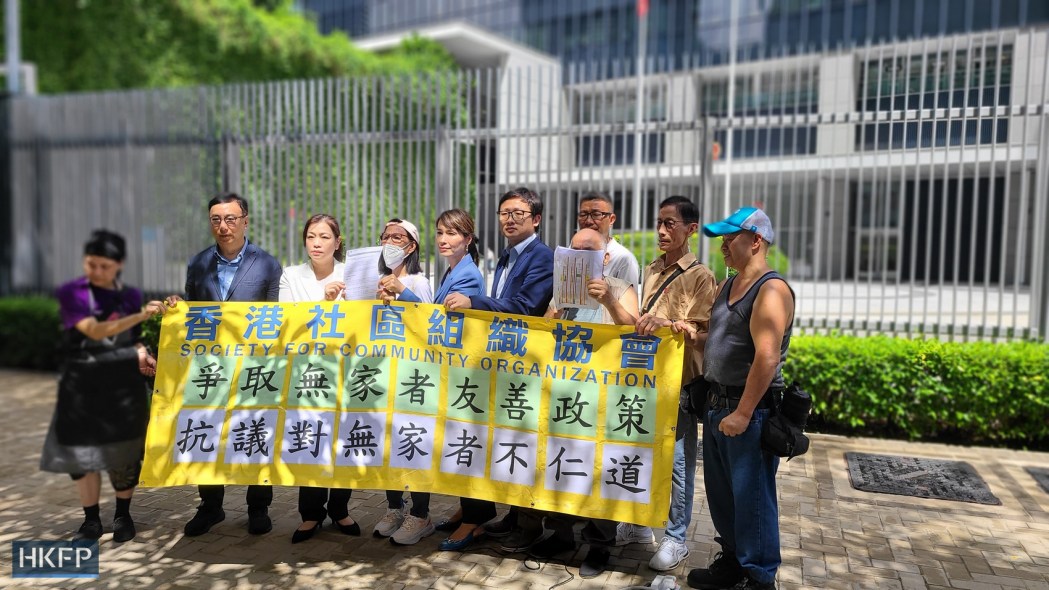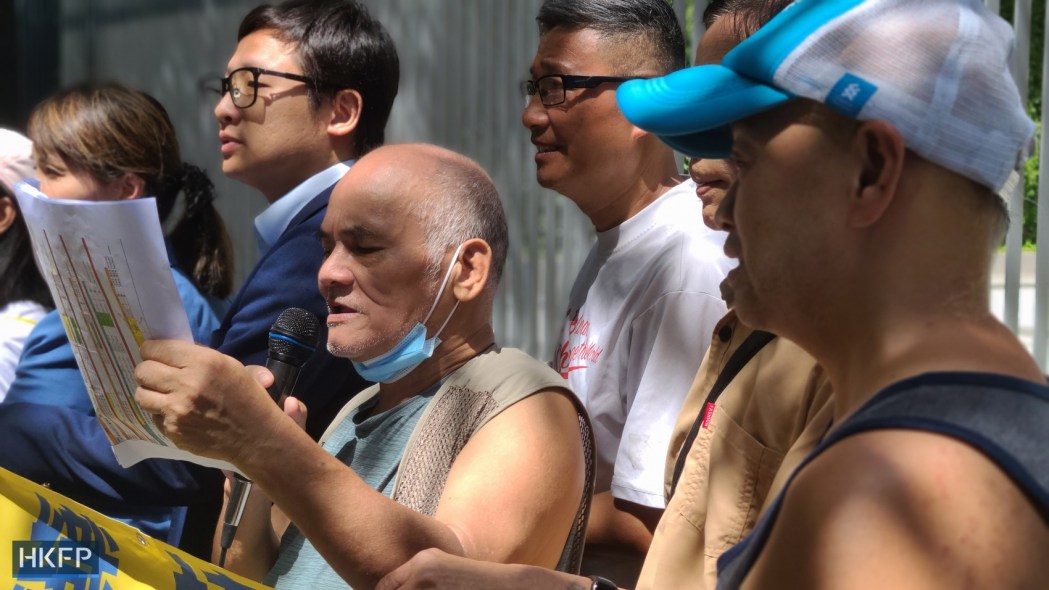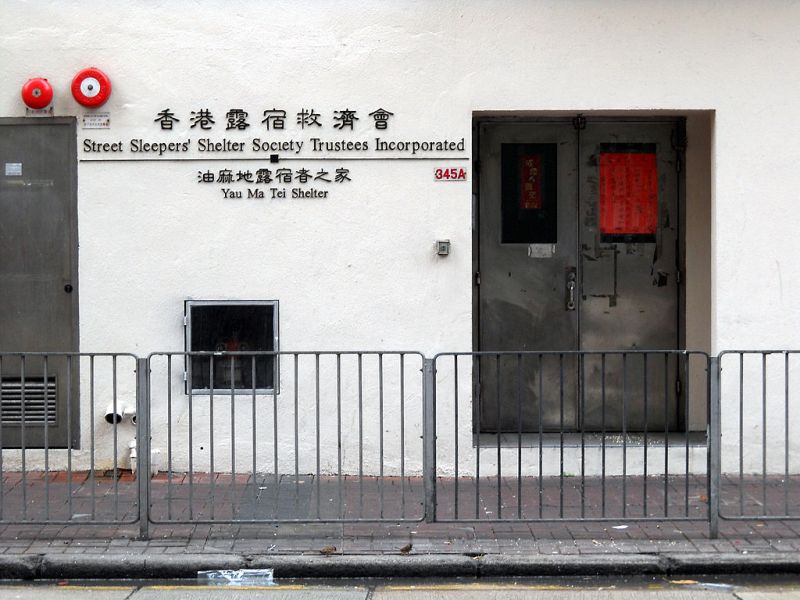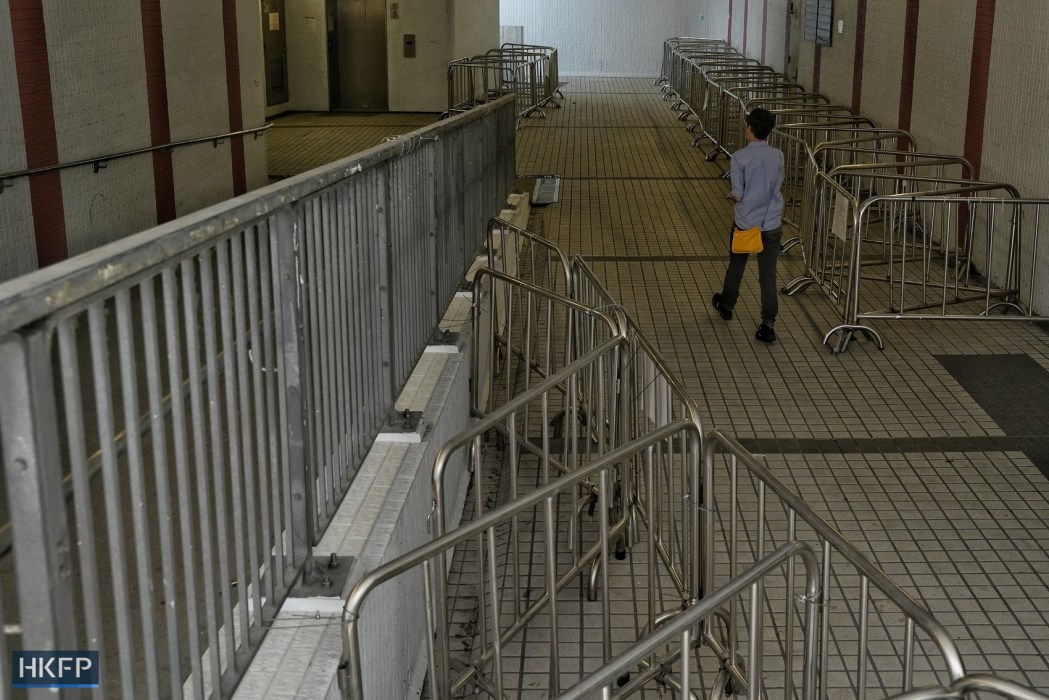There is increasingly little room for Hong Kong’s homeless as the government has blocked a number of popular sleeping sites in the city but failed to provide enough places in shelters, an advocacy group has said while petitioning outside the government complex.

Five homeless people participated in the petition organised by the Society for Community Organization (SoCO), an NGO serving the disadvantaged, on Monday. Five lawmakers also attended to receive the group’s petition before joining a meeting to discuss policies on homelessness.
After the petition, at least five police officers read organiser and SoCO social worker Ng Wai Tung a statement reminding him “not to violate any national security laws.” Police also asked journalists whether they could take photos of the press release.
“How could we endanger the nation as the elderly, the weak, and the disabled? We are simply helping the government improve its policy making,” Ng told HKFP. He said that police read him a statement for the first time when he petitioned in June with two elderly people.
According to the law, police do not need to be notified about public meetings with fewer than 50 people or marches with under 30 people.

The five homeless people said that since February, places they commonly used for sleeping – such as tunnels and footbridges in Tsim Sha Tsui, Mong Kok, Tai Kok Tsui and Jordan – had been partially blocked by the government, expelling the street sleepers.
Ah Ming, 68, told HKFP that he used to stay in the Cherry Street tunnel in Tai Kok Tsui until the government placed barricades in the tunnel around three months ago.
“Now I have to rent a small room in a hostel. It costs around HK$4,000 per month, exceeding the rental allowance I got from the government, ” Ah Ming, a cook, said, adding that he lost his job during Covid and experienced homelessness. He now lived on the government’s Comprehensive Social Security Assistance, which provided HK$2,475 rental allowance per month, significantly below Hong Kong’s average rental prices.
“Barricades are an invisible killer for the homeless,” another homeless person, Yuk Kuen, said, adding that the barricades not only drive homeless people away, but also sent the signal that it was acceptable to discriminate against street sleepers.

“By setting up barricades, the authority is also labelling us of blocking the streets. But we have no choice, no one hopes to be homeless if they could find a home,” Yuk Kuen said.
In the Salisbury Road pedestrian tunnel in Tsim Sha Tsui, a common place for homeless people to sleep, steel barricades had been set up along the tunnel, blocking half of it, HKFP observed,
SoCO social worker Ng said the group had arranged a meeting with employees of the Home Affairs Department in late May. “The department said there were ‘improvement projects’ underway, therefore they set up the barricades,” Ng said.

Responding to enquiries from HKFP, the Home Affairs Department’s Yau Tsim Mong District Office said the tunnels in question were “pedestrian facilities,” adding that complaints had been received about “the accumulation of articles which have caused obstruction to public passage, as well as environmental hygiene (such as rats and cockroaches), security and fire hazard concerns.”
Notices were posted asking that the “accumulated articles” be removed ahead of maintenance, including repainting and placing planters, the district office said. “Information leaflets and notices in different languages were also distributed and posted at these locations multiple times so that the concerned parties were made aware of the support services and assistance available, including temporary shelters, short-term hostels, social worker referral services, social welfare support services, employment guidance, etc.”
The barricades will be removed once work is completed.
Shortage of safe shelter
Ng said the number of homeless people in Hong Kong had more than doubled over the past 10 years, and the number of beds in homeless shelters had not kept up with that pace of increase.
According to government statistics, there were 595 street sleepers in 2013 according to the Social Welfare Department. By 2022, the number had risen to 1,582.

In 2013, there were 202 places in homeless shelters provided by NGOs funded by the government, while in 2023, there were 228, with an increase of 12.8 per cent.
Only around 30 places were allocated for females.
There is a major shortage of public housing in the city, with applicants for the government-subsidised flats waiting on average 5.3 years. Non-elderly single people see the longest queue, waiting nearly 20 years before allocation.
Homeless-friendly
SoCO has called on the government to make a policy to destigmatise homelessness and offer comprehensive support for accommodation and health, which it said would require inter-departmental collaboration.

Lawmaker Doreen Kong, who attended the petition, said she supported launching a homeless-friendly policy. “Before we can help all homeless to have home, we should be friendly to them,” Kong said, “Everyone needs a chance to live.”
Kong said that the government should set up “a special unit under the chief secretary for administration” to deal with complex social issues such as homelessness. “Homelessness requires services from medics, employment, housing and welfare. If there is not a centralised unit, every bureau will be operating independently, ” Kong said.
Legislators Tik Chi Yuen, Gary Zhang, Lillian Kwok and Bill Tang also attended the petition.
Support HKFP | Policies & Ethics | Error/typo? | Contact Us | Newsletter | Transparency & Annual Report | Apps
Help safeguard press freedom & keep HKFP free for all readers by supporting our team

LATEST FROM HKFP
HKFP has an impartial stance, transparent funding, and balanced coverage guided by an Ethics Code and Corrections Policy.
Support press freedom & help us surpass 1,000 monthly Patrons: 100% independent, governed by an ethics code & not-for-profit.










